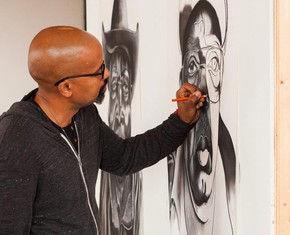The views expressed in our content reflect individual perspectives and do not represent the authoritative views of the Baha'i Faith.
“If you want the facts, read non-fiction. If you want the truth, read fiction.” When I taught literature at a university, I always put those two sentences at the top of each class syllabus.
I can’t remember where that dictum originated – maybe I came up with it, or someone else did and I’ve forgotten who – but whatever its origin, I firmly believe in the accuracy of the statement.
Like poetry, fiction allows its authors the creativity and the literary license to take the most deeply and profoundly true things they’ve learned from life and incorporate those truths into their work. Novelists, short story writers, playwrights, and scriptwriters aren’t bound by the rigid factual constraints of biography or the physical boundaries of the material world or the recorded events of history – instead, they can delve deeply into human drives, motivations, and attributes, using fiction to explore inner as well as outer landscapes.
RELATED: Crossing the Line – A Memoir of Race, Religion, and Change
Maybe that’s why our best artists can sometimes function as advance alarm systems – what the writer Kurt Vonnegut called his “canary in the coal mine theory of the arts.” In an address to the American Physical Society later published as “Physicist, Heal Thyself” in the Chicago Tribune Magazine in 1969, Vonnegut wrote:
I sometimes wondered what the use of any of the arts was. The best thing I could come up with was what I call the canary in the coal mine theory of the arts. This theory says that artists are useful to society because they are so sensitive. They are super-sensitive. They keel over like canaries in poison coal mines long before more robust types realize that there is any danger whatsoever.
Perhaps fiction possesses that super-sensitive function because it can veer deeply into the spiritual realm. For that reason, we read books and see plays and films that speak not only to our minds but to our hearts and souls.
All of this means that a story can be truer than truth – that it can hold and transmit the deepest of meanings.
Indigenous cultures know that stories – a narrative told in poems, songs, ceremonies, fables, myths, and tales – can captivate audiences, carry moral authority, and convey penetrating themes relevant to real life. Those cultures view art as a gift of the Great Spirit, an emanation of something sacred, a holy endeavor intended to carry the culture forward.
The Baha’i teachings confirm that concept by enthusiastically encouraging artistic endeavors of every kind. Abdu’l-Baha, quoted by Lady Blomfield in her book The Chosen Highway, said:
All Art is a gift of the Holy Spirit. When this light shines through the mind of a musician, it manifests itself in beautiful harmonies. Again, shining through the mind of a poet, it is seen in fine poetry and poetic prose. When the Light of the Sun of Truth inspires the mind of a painter, he produces marvellous pictures. These gifts are fulfilling their highest purpose, when showing forth the praise of God.
When Abdu’l-Baha spoke to the writer Mary Lucas on this subject, as she recounted in her book A Brief Account of My Visit to Acca, he explained one of the reasons why all people love the art of a good story:
It is natural for the heart and spirit to take pleasure and enjoyment in all things that show forth symmetry, harmony, and perfection. For instance: a beautiful house, a well designed garden, a symmetrical line, a graceful motion, a well written book, pleasing garments – in fact, all things that have in themselves grace or beauty are pleasing to the heart and spirit …
Art, then, can create the most beautiful possible expression of the human spirit – and in the process, serve as a prescient predictor of what humanity faces in its future.
That might help explain why more Baha’i characters are showing up in fiction and film lately.
Last month, I read the renowned British author Ken Follett’s newest novel Never, a frighteningly realistic, urgent work of fiction about a global crisis that could lead to the outbreak of a third world war. One of the book’s characters is a Baha’i – an Iranian national persecuted in his adopted African country for his Faith. Placed at the thematic center of the book, the character says Baha’is “believe that all religions are good, because all worship the same god, though they give him different names.”
The author obviously did his research well, because he modeled his character’s dialogue on the Baha’i teachings themselves. Abdu’l-Baha said, in a talk he gave in Montreal in 1912, that:
All people worship the same God and are alike His servants. When they are able to communicate freely, they will associate in friendship and concord, entertain the greatest love and fellowship for each other, and in reality the Orient and Occident will embrace in unity and agreement.
The world is in greatest need of international peace. Until it is established, mankind will not attain composure and tranquillity.
Akeem, the Baha’i character in Never, doesn’t take up much real estate in the novel – but he has a very important thematic role to play. He embodies the gentle, peaceful, unifying approach to the world that the author clearly believes we all need to adopt to avert a potential global calamity. Follett’s book fully imagines the worst possible human disaster – a global nuclear catastrophe – and horrifyingly presents it as a very real possibility. While the book may give some readers nightmares, it can also serve as Vonnegut’s canary, if we pay attention and focus on the author’s warning.
RELATED: Honest Spiritual Storytelling
Artistic and literary works like Never can take us to the brink of the precipice, and let us see what could happen if we continue on our current path and fall off that perilous edge. Reading a book like this one forces us to visualize the end results of continuing our present course, and also allows us to imagine what taking another path might involve. Baha’u’llah taught that the purpose of all artistic endeavor, and of all learning, is the promotion of “the well-being of the world:”
The purpose of learning should be the promotion of the welfare of the people, and this can be achieved through crafts. It hath been revealed and is now repeated that the true worth of artists and craftsmen should be appreciated, for they advance the affairs of mankind. Just as the foundations of religion are made firm through the Law of God, the means of livelihood depend upon those who are engaged in arts and crafts. True learning is that which is conducive to the well-being of the world, not to pride and self-conceit, or to tyranny, violence and pillage.
We can learn much about the well-being of the world from literature. Because cautionary tales like Never explore humanity’s yearnings and motivations so deeply, and because such stories give us a glimpse into the dystopian future we may face, they offer us a way to consider what could happen if we continue traveling down the fractious road we’re on – or what might occur if we decide to take a different direction toward unity and peace.
















Comments
Sign in or create an account
Continue with Googleor